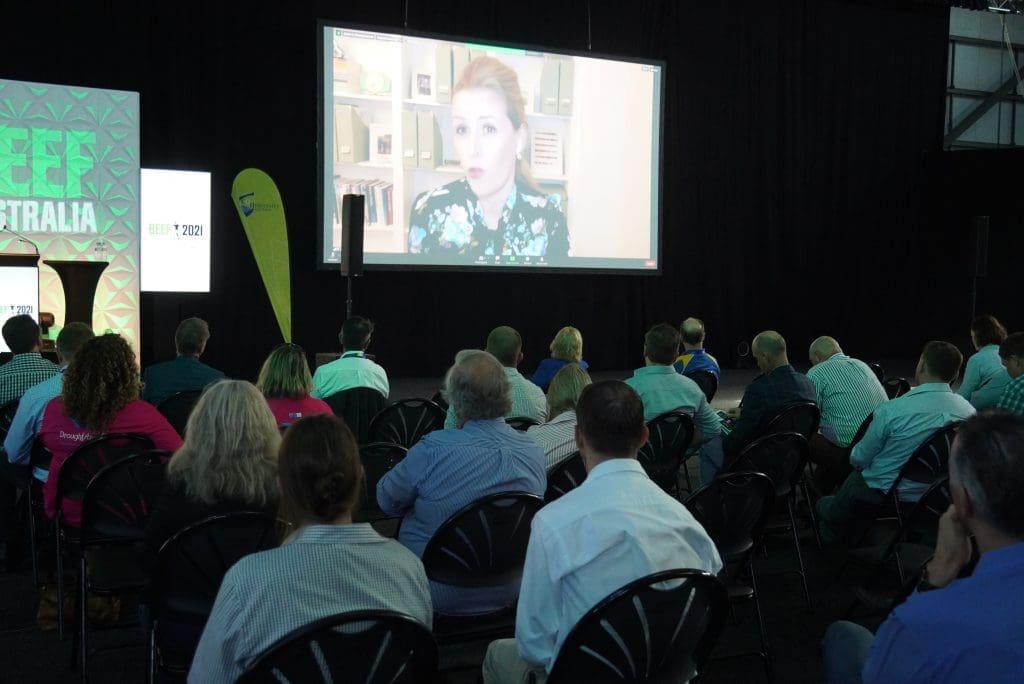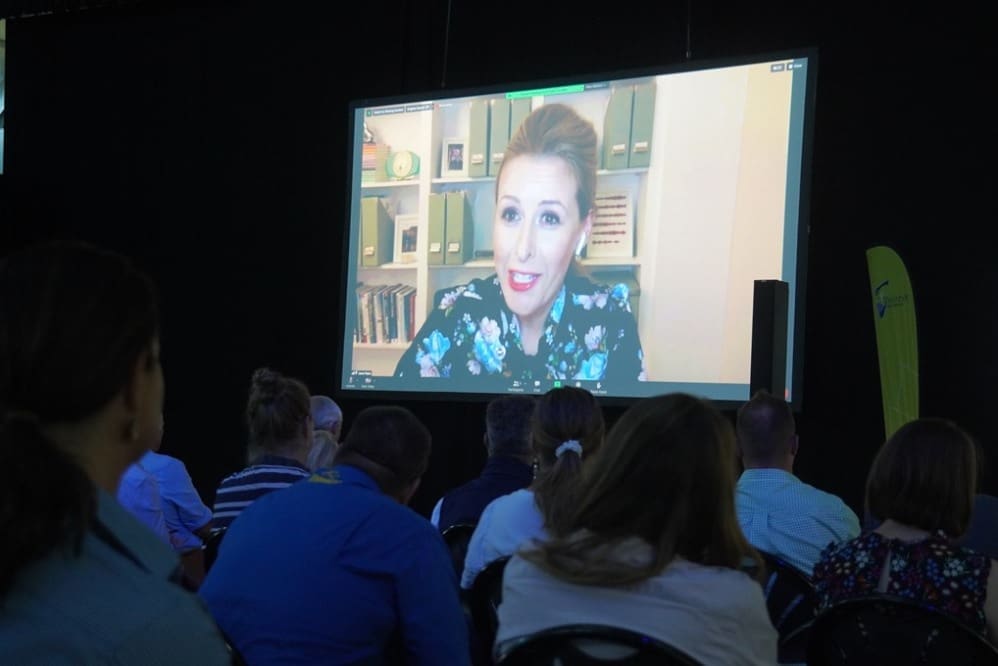
Global Meat Alliance co-founder Laura Ryan addresses last week’s symposium in Rockhampton via Zoom
THE anti-meat movement is one of the key challenges facing the global meat industry, and the strategic solution lies in collaboration among red meat interests around the world to create a compelling, positive narrative to defend the industry’s position.
That’s the view red meat industry advocate Laura Ryan, the UK-based global head of the Meat Business Women group and co-founder of the Global Meat Alliance.
“We’re at the absolute crossroads – the anti-meat lobby is so well funded and so well aligned, so challenging and threatening that we need to have safety in numbers,” Ms Ryan told an industry symposium during Beef 2021 in Rockhampton last week.
Addressing the audience remotely from her UK base, the gifted marketing and management consultant said throughout the global COVID pandemic, consumers had reconnected with beef
“They’ve remembered how much they enjoy it, and how the cook it, and are actively looking for new recipes and ideas.”
“But there remains a drum-beat of scepticism around the beef industry and it will be really interesting to actually see how consumers start to behave as we come out of the pandemic,” she said.
Even though what consumers were saying and doing were two different things, Ms Ryan identified two important upcoming events that could represent a crossroads for the red meat industry – the United Nations Food Systems Summit coming up in late May, and the UN Climate Change Conference (Cop 26), hosted in Glasgow, towards the end of the year.
“Both represent huge challenges for the beef industry,” she said.
“I have never experienced the inter-governmental and non-government organisation pressure that we are experiencing now, and it is (hard to overstate) how important it is that we (the global meat industry) meet and look at these developments in a strategic way.”
The Global Meat Alliance, which Ms Ryan co-founded, was a tool to help drive industry’s response to such challenges, she suggested.
“Twelve months ago, as COVID was sweeping across the world, I was working closely with the International Meat Secretariat. The IMS does a fantastic job, but they are only a small team and have quite a narrow band-width.”
Supported by Jason Strong and MLA, she and her colleagues embarked on a mission to grow something bigger – a global meat alliance, going down the ‘pre-competitive route’ of industry boards and commercial organisations working together.
Its purpose was to create a positive global narrative for the meat industry and to connect, share and develop key messages.
“Because we are a fragmented industry – working across different countries, different production systems and within different commercial organisations (often competiting in the marketplace), we do have a lot of challenges,” Ms Ryan said.
In contrast, the powers working against the meat industry were “so well aligned, well-funded and well-exposed.”
Lessons from others
Ms Ryan said the Global Meat Alliance had learned a lot from other livestock and food organisations, such as the parallel Global Dairy Platform.
“Earlier this year they basically told us that the meat industry, on a global, international and governmental level, was missing in action,” she told last week’s symposium.
“But the Global Meat Alliance is working to try to plug that gap, and to share best-practise and insight, and develop joint programs that positively impact consumer behaviour about our industry and our product.”
“We share in a pre-competitive way, the voice of the global meat industry and we trust in partners at government, industry board, and commercial business level – finding that all important alignment, moving at pace to deliver modern change through a global meat industry.”
Because the UN Food Systems Summit is happening later this month, the Global Meat Alliance, working alongside MLA, plans to hold a global dialogue for the meat industry, fuelled by the “Australian passion to drive the global meat sector forward,” Ms Ryan said.
Who’s involved?
Still in its first year of operation, the Global Meat Alliance project has received seed funding from 15 industry levy boards and commercial companies. Groups involved come from Australia, Canada, New Zealand, Wales, Uruguay, Northern Ireland and Scotland. Outside industry representative bodies, commercial supporters include New Zealand’s biggest beef and lamb processor, Silver Fern, European value-added and retail-ready meat processor Hilton Food Group and European processors Cranswick PLC and Dunbia and ABP Food.
The first year of seed funding lapses in June, and Ms Ryan and her cohort at Global Meat Alliance will be making approaches over the next six weeks to seek industry support to grow the program for next year.
“It’s always difficult because everybody is tucked-up for cash all the time, but from what I see within the Australian industry – perhaps partly because of its heavy export focus – the willingness to try to see the passion of this space, has been instrumental in giving us the confidence that this is the right way to go, and to keep on pushing, when some other groups are saying, ‘We don’t need this’.”

Asked by Beef Central what the prospects for success were, against a formidable well-oiled anti-meat lobby, Ms Ryan said the global meat industry could not afford for the program not to be successful.
“The Global Dairy Platform (the dairy industry’s equivalent of GMN) is ten years ahead of us. Their planning for the upcoming UN Food System talks started almost a year ago. The red meat industry, in comparison, started in February,” she said.
“We need the red meat industry across the world to come together in this,” Ms Ryan said.
Retired meat exporter Richard Rains asked what it was that drove the anti-meat movement, and why they had to be so ‘vocal.’
“Last week we (the Global Meat Alliance) heard from a an American journalist, who said whenever she goes and writes anything positive about the meat industry – challenging any of the anti-meat rhetoric – she basically loses business. She has friends in the scientific community and in journalism who have had their careers ruined because they stood up for the meat industry.”
“When we unpacked this last week, it’s the funding from billionaires like the Bill Gates of this world, who are bank-rolling the anti-meat movement. In comparison we (the meat industry) are a loose collection of people – we can never stand up to it individually, so it is critically important that we work together.”
“There are some conversations around whether this detracts from other sustainability issues, to make animal agriculture the scapegoat, or is this a moral issue that folks may have. I don’t know all the answers, but I just know the pressure against us is huge – and that’s why I am convinced that we can’t tackle this individually, as nations or people – we need to come together in this space.”
“Some consumers are saying they are bothered about meat consumption – but it’s not what they are actually doing in the marketplace. In Europe at least, consumers are actually buying more meat. It’s just now that the likelihood of policy changes driven by the United Nations may well be the challenge – not actually what consumers want – which is nothing that we have actually experienced before.”
